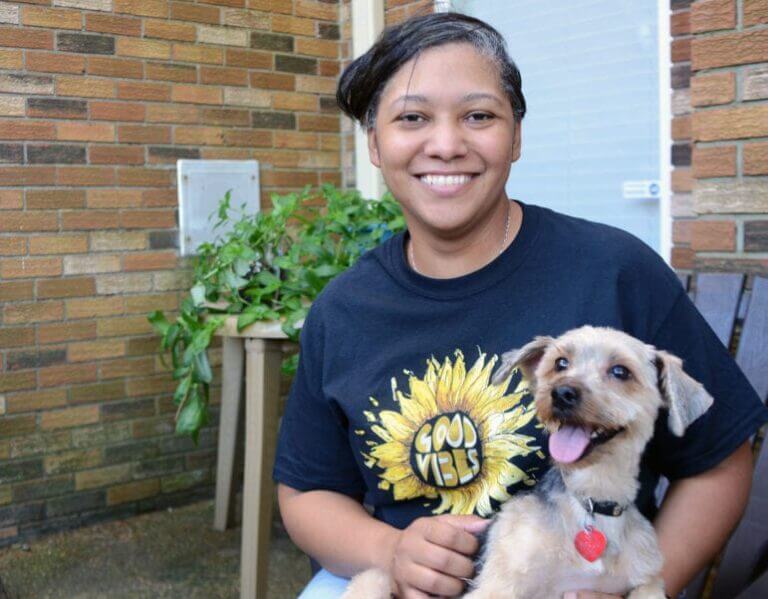
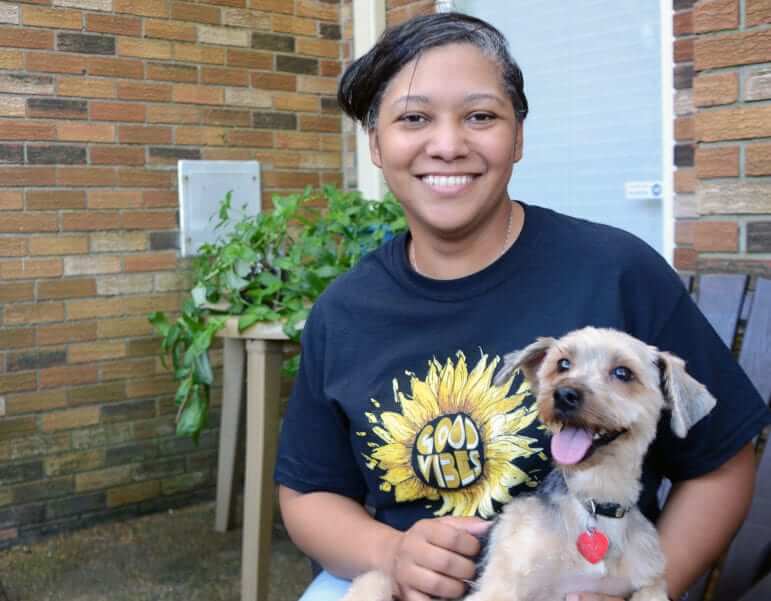
Vickie D. King/Mississippi Today
Challise Burciaga of Brandon, with 4-year-old Yorkie terrier Rudy. Burciaga is a survivor of COVID-19.
COVID-19 highlights lung health gaps in Jackson, but a group of chest doctors is listening
By Erica Hensley | November 27, 2020
JACKSON — Challise Burciaga still remembers early country mornings with her grandmother in Amite County. When Grandma got up at dawn, Burciaga got up too.
The two shared a room so Grandma could keep an eye on her young granddaughter’s breathing. While her sisters slept spread out in bedrooms across the country home, Burciaga was up with the sun and roosters.
But bright summer days on the farm taunted her. While her sisters played outdoors roaming the farmland, Burciaga was stuck inside. As a young child, she developed a bad case of asthma that kept her indoors. All the fun aspects of visiting Grandma’s land instantly became threats to fester her respiratory condition. Grass meant to roll in? A trigger. Dander from the farm animals? A trigger. Dust lurking in the aging barns and play places? A trigger.
The country clinics were not equipped to handle asthma attacks at the time, and she remembers having to carry her bag of medications along everywhere she went. In an emergency, she’d have to treat herself with meds and breathing exercises.
Battling bouts of episodes for years — a few scary ones that landed her in the emergency room — she learned to manage the respiratory condition. She found a pediatrician in her hometown of Vicksburg, never left home without her inhaler and generally learned to navigate the new normal. Her mom worked for the Army Corps of Engineers, so the robust federal health insurance was an asset, helping the family access inhalers, treatments and reliable health care.
After years of learning to manage her asthma despite insurance and job changes — at times, going without or over-extending her inhaler’s shelf life — she feels like she’s backsliding. Over the summer, Burciaga, 38, contracted the coronavirus and says her asthma symptoms haven’t been this bad since childhood.
Ironically though, she thinks her asthma history helped her COVID-19 case — she was able to catch it early and knew how to both manage and treat chest tightness. Her case wasn’t too severe — it started with a headache, then progressed to sinus congestion and chest tightness. She immediately started exercises and home remedies that helped her asthma, and they helped relieve her symptoms.
Knowing her body and particularly her lungs helped, she says. “I’m paying attention to every little symptom that I got. And I think that helped me a lot too. I caught mine really, really early. I could feel it starting,” she said, noting the familiar tightness that creeps up her chest.
She’s recovered now, but worries about the unknown ramifications of COVID-19 on her already weakened respiratory system. She’s not alone — though treatments are improving, research is struggling to keep pace with the novel coronavirus developments and doctors don’t yet know the disease’s long-term effects.
Jackson metro is one of the asthma capitals of the U.S. More people per capita experience complications from the respiratory condition than almost any other city, including regional areas with similar demographics, poverty and environmental conditions — all of which can factor into asthma rates. And of those who have it here, more people die from it than anywhere else in the nation — a worrisome sign that speaks less to the disease itself and more the lacking treatment around it.
Burciaga’s experience is not unique. When it comes to lung conditions specifically, research shows Black Americans are disproportionately high-risk and less likely to get apt care to help manage those conditions. While Black Americans are two times more likely to have asthma, they are three times more likely to die from it. With lung cancer, early diagnosis and treatment is key — but Black Americans are 16% less likely to be diagnosed early, 19% less likely to receive surgical treatment, and 7% more likely to not receive any treatment compared to white Americans, according to a new report from the American Lung Association.
Burciaga teaches high school and has state health insurance, but she hasn’t found a primary care doctor who will reliably prescribe her affordable inhalers on her high-deductible plan. She struggles to find the same for her kids — 12 and 10, who qualify for the state-sponsored Childhood Health Insurance Program, or CHIP — one of whom has asthma and the other has bad allergies.
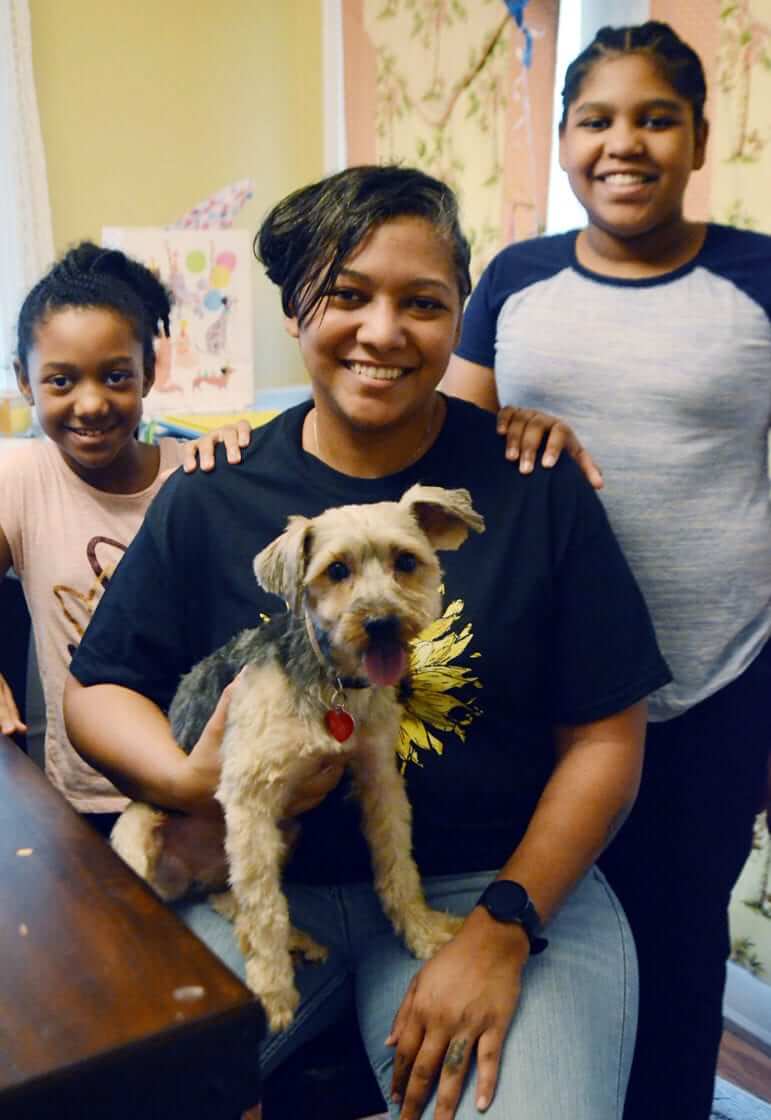
Vickie D. King/Mississippi Today
Challise Burciaga of Brandon, with daughters Skye Brittain, 10 (left) and Sania Brittain, 12, and their 4-year-old Yorkie terrier Rudy. Burciaga is a survivor of COVID-19.
Though she says she manages alright on a limited budget as a single mom, she doesn’t feel like she has a financial or medical safety net in an emergency. COVID-19 reminded her of that, as she rode it out at home, sticking to home remedies learned from decades of managing asthma.
Early disparities in COVID-19’s toll on Black Americans has highlighted a stark gap that has long festered in pulmonary care in the U.S. Though the disparities have lessened over time as more white people contracted the coronavirus, Black Mississippians — Black women in particular — still bear the brunt of COVID-19 spread overall. While Black and white women have both seen about 26,000 cases where race is known, because there are fewer Black women, their share of cases is disproportionate. Nearly 5% of Black women in Mississippi have tested positive, compared to 3% of white women.
Lung cancer and chronic lower respiratory diseases like asthma, emphysema and COPD not only are more common in Mississippi, they also kill at higher rates here — meaning health care workers devoted to caring for lung conditions are spread thin against worse cases.
As a stop-gap between pulmonologists and daily treatments, the role of respiratory therapists has been spotlighted during the pandemic. But there aren’t enough of them to go around, and hospitals worry their scarcity will soon limit the specialty treatment needed for severe COVID-19 cases as spread surges across the country. As of late October, there is about one respiratory therapist for every 100 COVID-19 cases in Mississippi — one of the largest ratios in the U.S. and double the nation’s average caseload, according to data from the Bureau of Labor Statistics.
Respiratory therapists manually do what your body can’t when breathing is obstructed, whether from a trauma injury that blocks airflow or when a disease, like COVID-19, attacks the lungs’ ability to breathe on their own. They work every unit in the hospital, manually breathing either through “bagging the patient” by pumping air from a handheld pump into their lungs, or making sure the ventilator and intubation tubes are working at proper speeds.
Allasica Byrd, a respiratory therapist from Clarksdale says despite being the safety net for hospitals’ response to the pandemic, she and her colleagues aren’t paid or respected enough — and they’re burning out, something echoed by hospitals across the nation and in Mississippi. “People didn’t realize how important respiratory therapists are until pandemics and crises hit,” she said. “It’s a bad shortage in it. And they’re overworking us and they’re not paying (enough).”
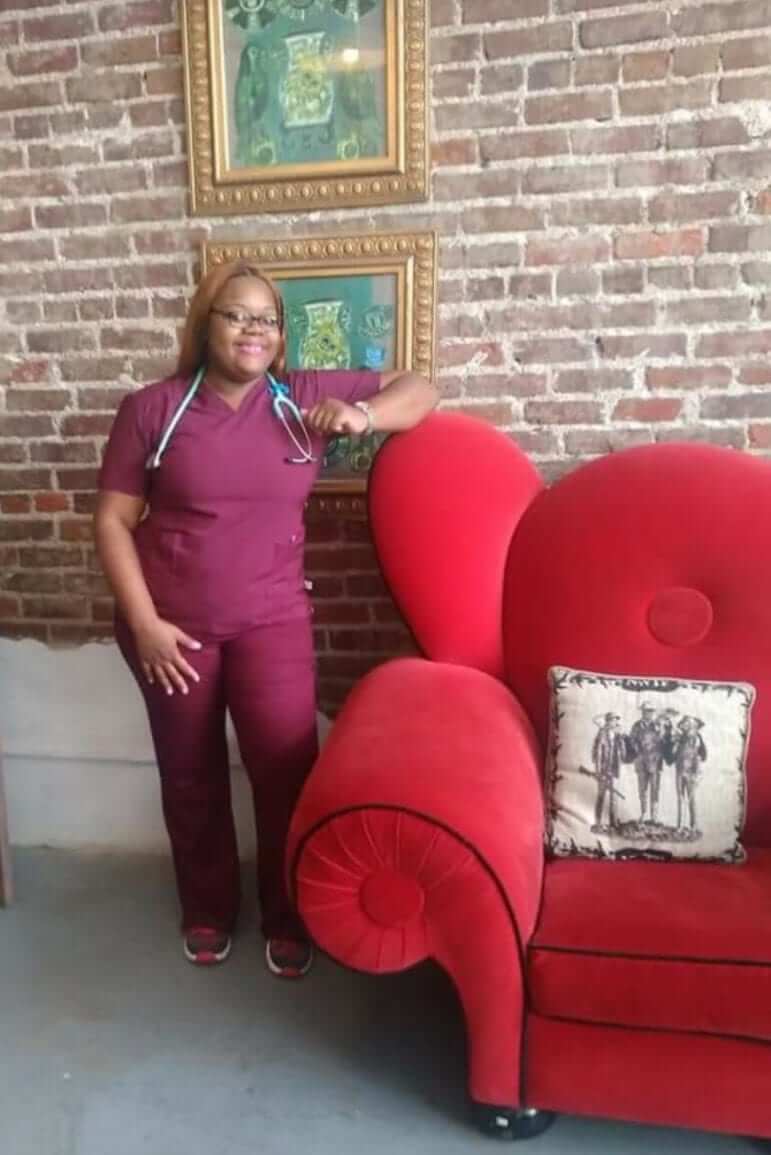
“We’re the ones running around saving and keeping everybody together. We’re the peanut butter in between the bread to keep everything together,” Byrd said. “I have to breathe for you – I got to know what I’m doing when I’m breathing for you.”
Mississippi has the lowest paid respiratory therapists in the nation. And though the state does have one of the densest number of respiratory therapists per 1,000 jobs and per capita, according to the Bureau of Labor Statistics, Mississippi also has one of the highest rates of and deaths to lung conditions per capita. Essentially the state has more of the lung specialists, but they’re in higher demand and have larger case loads because of the level of need.
The year has piled on challenges for practitioners and patients who are paying attention to public health factors: spotlighted respiratory disparities with COVID-19; ongoing challenges for patient access to care that’s exacerbated by health care worker shortages; and efforts to tackle institutional racism and bias in health care, sparked by renewed focus on the Black Lives Matter movement after white police officers killed George Floyd, an unarmed Black man, in May.
With all these factors in mind, the American College of Chest Physicians recently launched a new effort — listening. Their virtual Listening Tour launched September in Jackson, where one in seven residents have a chronic lung condition — 57 times the nation’s average. The tour, put on through the group’s philanthropy arm the Chest Foundation, brought together patients, like Burciaga, caregivers, community leaders, and providers to frankly identify real-world barriers that keep Jackson’s lung conditions so prevalent and chronic.
Providers participating in the new listening effort said starting in Jackson means acknowledging that robust access to care has historically fallen along racial and class lines, and addressing it will need an intersectional approach. But they too said, health care needs to get back to the basics of treating people, not just their disease.
“We have a health issue here in Mississippi but we have a bigger heart issue here in Mississippi. It’s not about Black and white, it’s not about insured versus uninsured, it’s not about low class versus high class, it’s just about humanity and dignity,” said Dr. Justin Turner, an internist in Jackson.
Jackson is a microcosm of barriers to accessing care, but in the hub of the state’s medical system. If each of the 26 practicing pulmonologists in Jackson, the densest physician population in the state, took an even share of all the patients with lung conditions, they’d have more than 1,600 patients each. Too, 16% of residents are uninsured, so finding specialty care is not the only problem — it’s paying for it.
The first stop on the new tour identified three major barriers to overall lung health in Jackson — all anecdotal, but also reflected in research: access to care and treatment, such as un- or under-insurance rates, high deductibles and medication cost; equity imbalance, like few Black doctors and health disparities; and lacking trust in the system.
Based on their report from the tour, the foundation is recommending actions across the pulmonology field, including: teach providers to ensure patients can afford medication when they prescribe it and keep up with the prescriptions; ensure easily accessible information about doctors who accept low-income health insurance; educate providers to identify and understand barriers to access; and, raise awareness of local resources to help address social determinants of health that exacerbate disparities.
Public health advocates have long-agreed that social determinants of health, like living in poverty, low levels of education and inability to meet basic needs like food and shelter are often the missing building blocks when it comes to overall wellness. And too often, it’s lacking the proper health insurance to cover surprise medical costs.
For Burciaga, she hopes sharing her story can help others learn about lung health and the disparities endemic to accessing care.
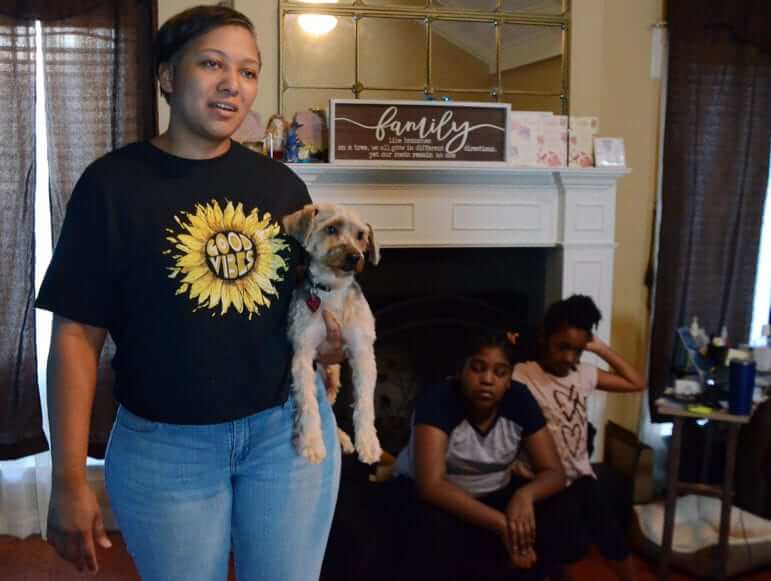
Vickie D. King/Mississippi Today
“I’m feeling fine now,” said Challise Burciaga in her Brandon home with dog Rudy, 4 and daughters Sania, 12 and Skye, 10. Burciaga recovered from COVID-19.
“As far as healthcare goes, I really wish it wasn’t such a political game,” she said. “That’s what’s so frustrating, is that they (lawmakers) use healthcare as a pawn in their game, but they’re not really even taking into consideration how it really affects people’s lives and how much some people really depend on it. It’s sad that the United States being what it’s supposed to be — the reputation of what it should be and is supposed to be — is so far from what it really is.”
The post COVID-19 highlights lung health gaps in Jackson, but a group of chest doctors is listening appeared first on Mississippi Today.
- State Supreme Court considers reviving former Gov. Phil Bryant’s lawsuit against Mississippi Today over welfare scandal coverage - February 18, 2026
- Winter storm update: Mississippi still waiting on fed declaration for individual assistance, lawmakers crafting plan to fund recovery - February 18, 2026
- Shy of special session, Mississippi school choice appears dead - February 18, 2026